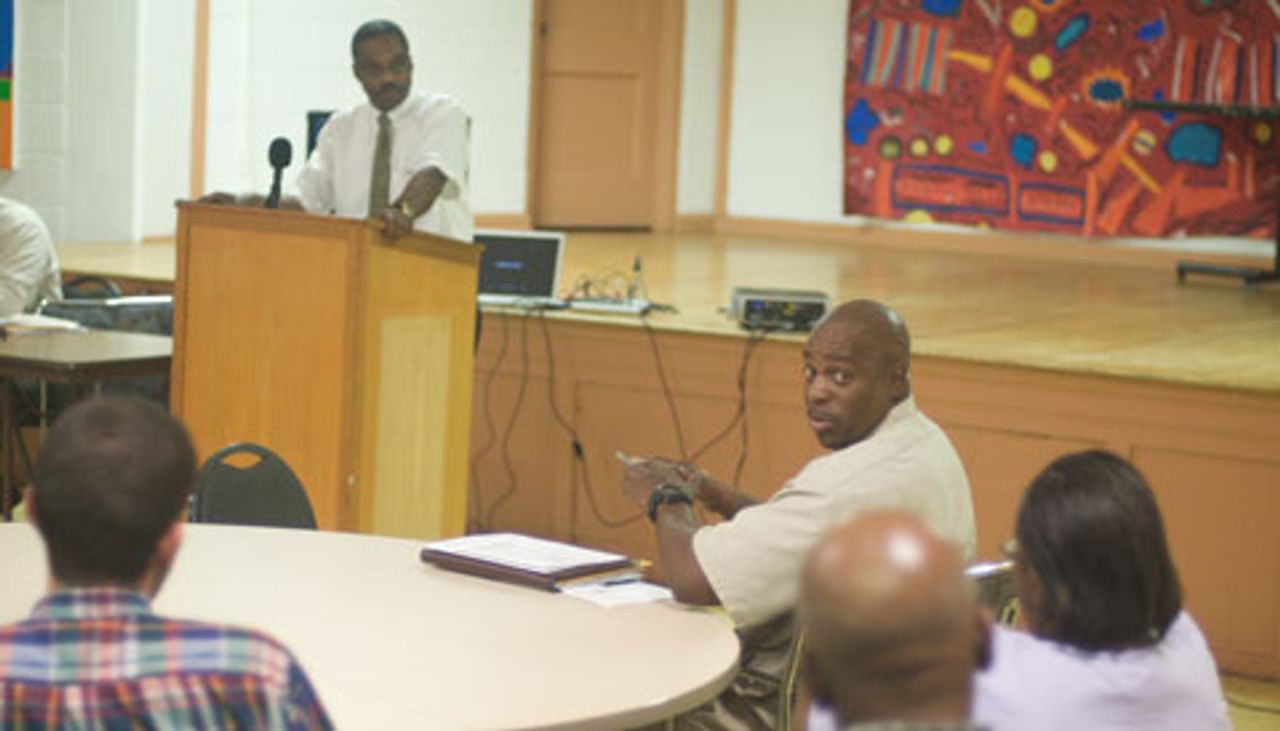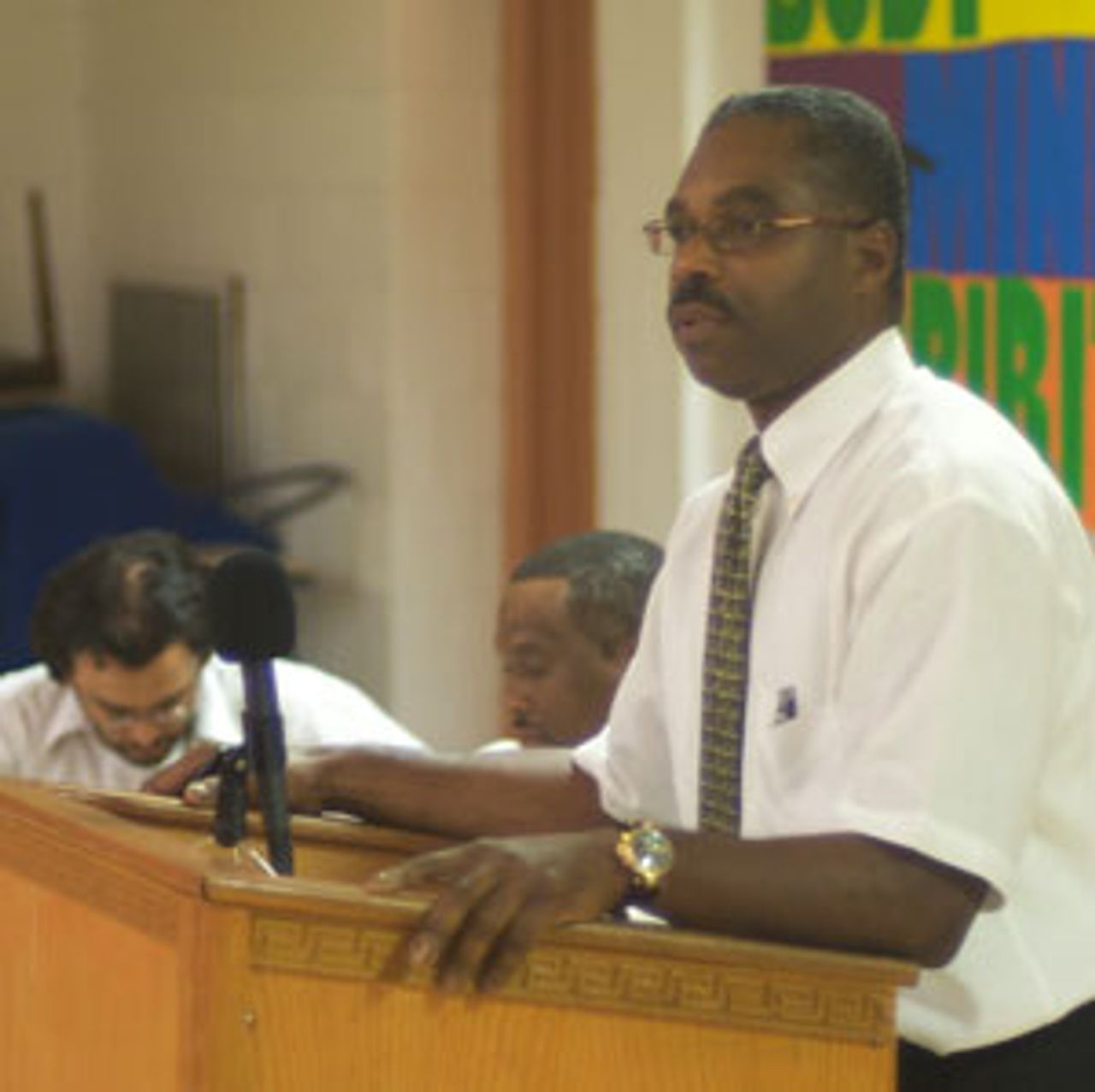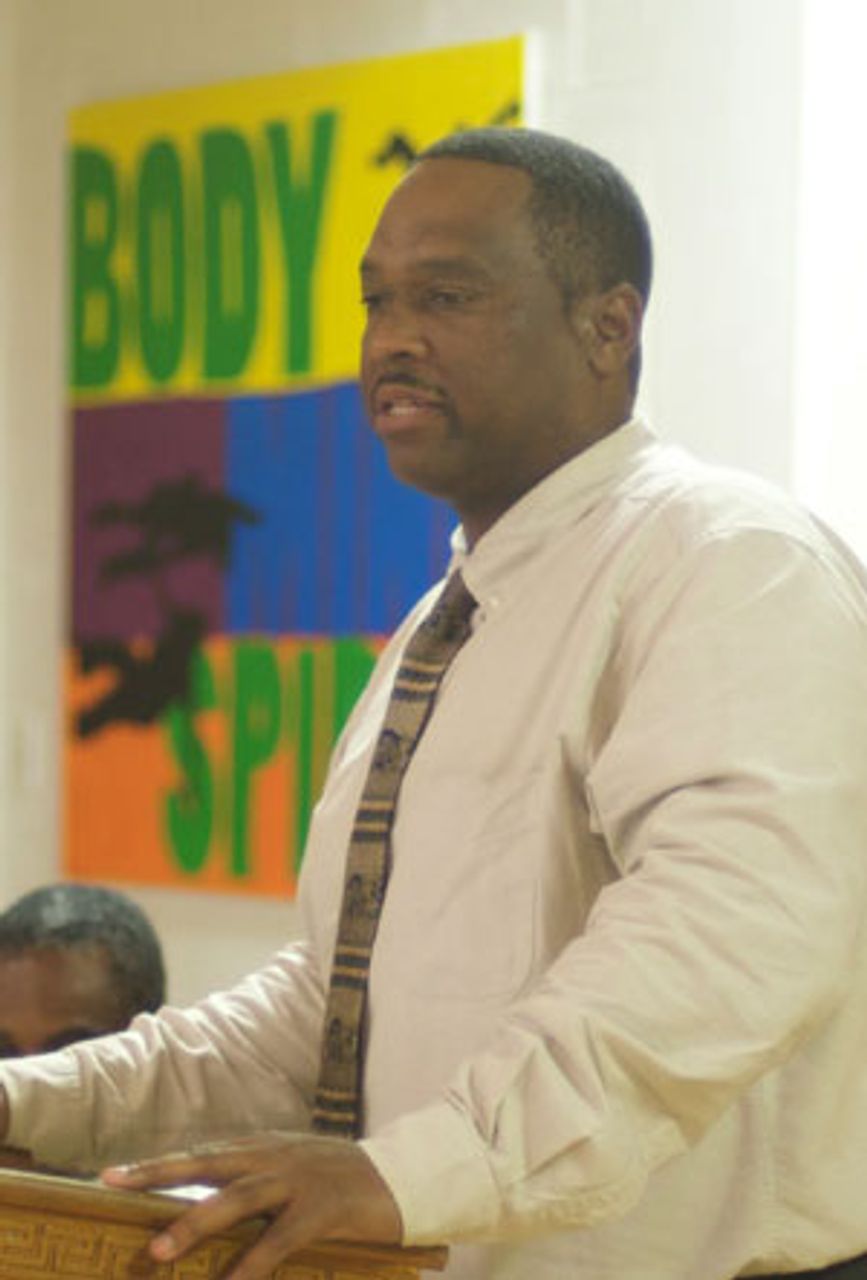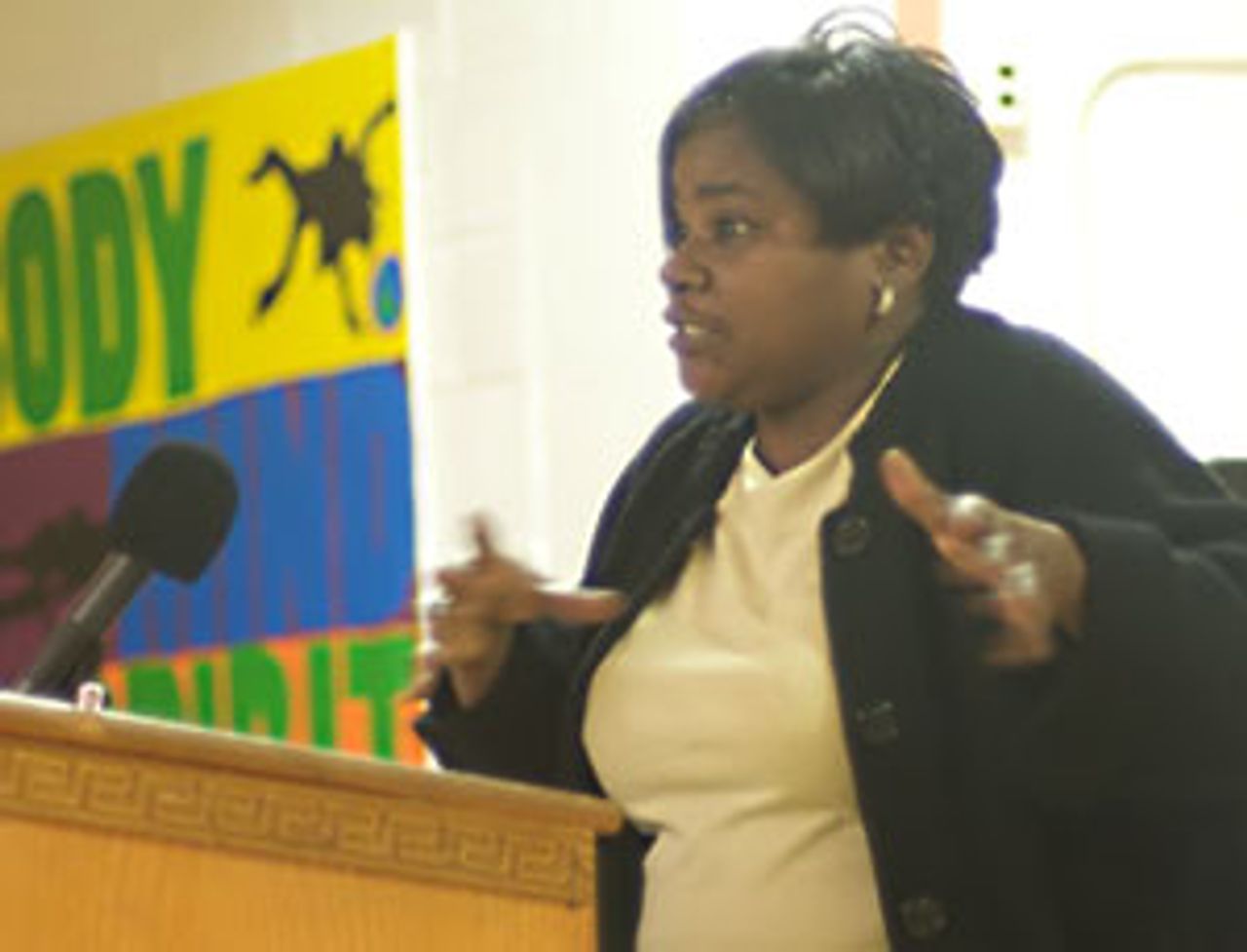 Discussion at the meeting
Discussion at the meetingAt the first meeting held by the Committee Against Utility Shutoffs (CAUS) on the east side of Detroit, area residents and CAUS members engaged in a lively discussion about the fires that broke out across the city on September 7, sparked by fallen power lines.
Speakers placed the blame for the disaster on the utility company DTE and on budget cuts by the Detroit city government under Mayor David Bing and previous administrations.
 Larry Porter
Larry PorterLarry Porter, assistant national secretary of the Socialist Equality Party and chairman of CAUS, started his opening report by rejecting the claim of Mayor Bing that the 85 fires, which destroyed 29 occupied structures, were a “natural disaster” caused by high winds. “Years of cuts to public services and the neglect of infrastructure by DTE,” were the real cause, Porter stated.
“The problems with the electrical grid were well known to DTE,” he added, noting that residents had repeatedly called the energy giant in the days leading up to the fire to report sparking power lines.
The city’s firefighters, who have seen their forces gutted by budget cuts, also knew of the dangers. Porter noted that at the time the fires broke out, “15 out of 58 fire companies, including 9 initial response units, were babysitting DTE’s downed lines.” The situation was made worse by the fact that every day “the city decommissions 8 to 12 fire stations out of a total 66 due to budget cuts.” On September 7, when firefighters were finally able to respond to emergency calls, they frequently encountered non-working hydrants, as a result of the dilapidated state of Detroit’s infrastructure.
In a vivid reminder of this fact, those at the meeting watched a video taken by three young residents of Moenart Street in Detroit, where a fire on September 7 engulfed multiple houses.
Porter explained that the fires and the unsafe condition of the city’s electrical grid are the result of DTE’s pursuit of profits at the expense of the needs of the population. Instead of investing in infrastructure, “the utility company primarily occupies itself with shutting off people’s service. In 2010, in the first seven months of the year, at least 237,000 households statewide have had their utilities shut off.”
“[Mayor] Bing and the Democrats are defenders of the rich and their class,” explained Porter. They view the fires as a way to further their plans to shut down the city, driving the poor out of Detroit so as to free up real estate for investors and manufacturers wishing to take advantage of poverty-level wages.” Porter noted that one woman he spoke to in a neighborhood burned by fires asked him rhetorically, “Are they just going to let everything burn down?”
 D'Artagnan Collier
D'Artagnan CollierD’Artagnan Collier, Socialist Equality Party candidate for the Michigan State House of Representatives in the 9th District, spoke following Porter. His remarks focused on the close relationship between the Democratic Party, Mayor Bing, and DTE.
Collier noted that DTE was able to make massive amounts of money—$315 million in the first two quarters of 2010 alone—even as its policies ruin the city because the political establishment defends and promotes the company’s interests. In addition to the fact that Mayor Bing sat on DTE’s board of directors for 20 years, Collier pointed out that “George Jackson, Jr., a former DTE marketing executive, now holds three different positions in Bing’s campaign to downsize Detroit.”
Listing the various organizations Jackson works for and their role in the mayor’s plans, Collier observed, “This one individual, who worked for DTE for 27 years, is the spider at the center of a web of agencies, all of which have roles in the restructuring of the city.”
Collier insisted that the community meetings that have been held in Detroit over the past two weeks to supposedly canvass residents about the mayor’s plans to shrink the city were little more than smoke and mirrors. The disdainful attitude of the mayor towards ordinary Detroiters became clear whenever he or his aids spoke at these events.
Collier went on to note that Bing and DTE carry out their work with the full support of the Democratic Party at the state and national level. Michigan’s Democratic Governor Jennifer Granholm recently signed into law a new bill increasing penalties for “energy theft,” while doing nothing to help ordinary people struggling to stay afloat. Similarly, the Obama administration has adamantly refused to use government funds to put people back to work or provide adequate aid to the nation’s bankrupt cities and states.
In conclusion, Collier called for the creation of “an emergency public works program to rebuild infrastructure and neighborhoods, while providing good-paying jobs for all who can work.” He insisted that utilities should be provided to all as a basic human right. In addition, he argued that those whose homes were destroyed on September 7 “must be made whole” by being “provided with new, modern and safe houses, as part of the planned reconstruction and rebuilding of the entire city.”
“The funds for such a program must be made available through the transformation of DTE and other giant corporations into publicly owned enterprises, democratically controlled by working people,” he said.
A lengthy Q&A session followed the remarks by the two speakers.
 Valeria McKinstry
Valeria McKinstryValeria McKinstry, who lived on one the streets that burned in the September 7 fires, spoke about losing her utilities after being a couple of days late with her payment. “Their only concern is their money,” she said.
Valeria also asked why the city’s power plant was not being used to provide Detroit residents with electricity. Collier explained that the plant has been chronically underfunded for years. “Both the current and previous administrations decided the facility was not worth upgrading, and that it was best to let DTE be the sole energy provider in Detroit.”
 Ola Randolph
Ola RandolphValeria added that she thought areas where the September 7 fires occurred should be properly surveyed for contamination and other health dangers. Noting that she felt ill for three days after the fires and that her home has since become infested with rats day and night, she raised the question as to what toxins—asbestos, lead, etc.—might have been released in the air and ground by the fires. This issue was then taken up in a list of resolutions voted on at the meeting.
Ola Randolph, a resident of Moenart Street who is now living with her son because the attic of her home was destroyed in the September 7 blaze, pointed out that it took the city just two days to bulldoze the burned-out homes on her block. “Why?” she asked. The purpose was clearly to prevent any sort of investigation into the causes of what happened.
 James Randolph
James RandolphJames Randolph, Ola’s husband, asked what legal means the city could use to force people out of their homes. Larry Porter explained that one method is to dismantle all public services in the city—schools, electricity and gas, garbage pickup, etc.—so that people have to leave.
Speaking from the floor, Patrick Martin, a member of Socialist Equality Party, warned that the mayor would likely go beyond the use of incentives and manipulation to shrink the city. “When push comes to shove, they will use force,” he said. “Remember what happened in Poletown. Residents were driven out when GM decided that it wanted that land for an auto plant.”
At the end of the evening, the meeting unanimously approved three resolutions:
- Those who lost homes in the September 7 fires or had their property damaged must be fully compensated for their losses at the expense of the City of Detroit and DTE.
- Utilities must be made available to everyone as a basic social right, not subordinated to the profit needs of the utility companies. Utility companies should be transformed into publicly owned and democratically run enterprises.
- There must be an investigation into the September 7 fires and their lasting impact on the health and safety of the communities in which they occurred. This investigation must be independent of the City of Detroit and DTE.
SEP National Secretary Joe Kishore closed the gathering by declaring that the reports and discussion revealed the incredible control that DTE has over Detroit and the widespread misery the company and its government representatives have created for ordinary people. But, he added, “This can’t last forever. There is no lack of anger over these conditions. There will be a broad opposition that develops in the working class. The question that then arises is on what political program.”
He called for the building of an independent political movement of working people, separate from and opposed to the two parties of big business, to lead this fight. Kishore urged all those in attendance to join CAUS and the Socialist Equality Party.
 Ian Perrotta, Rob Strom and Andrew Perrotta
Ian Perrotta, Rob Strom and Andrew PerrottaAfter the meeting, the World Socialist Web Site spoke with some of those in attendance. Ian Perrotta, one the young men who filmed the fire on Moenart Street, remarked, “There should be an investigation into the circumstances of this fire. But that’s exactly what Bing is trying to prevent. That’s why the city leveled all these houses within two weeks. Bing’s reaction was despicable. This meeting is talking about things that aren’t being talked about in the mainstream media.”
Cheryl Moore, president of the North Central Block Club Association, as well as a minister and a registered nurse, explained that her church burned down several years ago: “We did not have water in the hydrant. They had to go two blocks down to get water and they had to bring in water trucks.”
She explained that she supported the goals of the Committee Against Utility Shutoffs. “Gas water and electricity are basic rights. DTE has no competition, and they are making millions of dollars. They now have electric and gas bills combined together. Before, they were separate—if your lights were turned off, you could still use your gas. With both together, you are hit hard. It is difficult for low-income people who don’t have a lot of money and are on a payment plan.”
